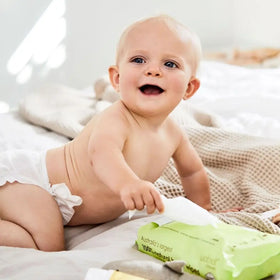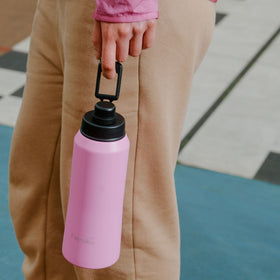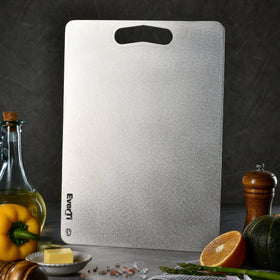
Shopping Guide: What To Look For In Natural Laundry Powders
Your favourite laundry detergent may get your whites white and your colours fast, but have you ever wondered how it affects everything else it touches? What does it do to your skin, your lungs, your pets, the air in your home and the waterways downstream?
Unfortunately, if you’re still using conventional laundry products, you might not like the answer to that.
 |
I made the switch to green cleaning products a long time ago, after learning about the many questionable chemicals in the big name brands I was putting in my shopping cart. I’ve learned that laundry detergents leave a chemical residue that can be absorbed into our skin or inhaled into our lungs. Sometimes, the chemicals in that leftover goop have ill effects like eczema, eye irritation, and rashes. Some of them are endocrine disruptors and possible carcinogens. And we don’t even need many of these ingredients in the first place!
After being clued in on all this, I decided to green up my family’s laundry. Today, we’re helping you do the same by showing you what to look for and what to avoid when choosing natural laundry products.
Say 'no' to:
Manufacturers have already removed some of the problematic chemicals from laundry products. But there’s still a lot of sneaky ingredients out there that can really harm your health and the environment. There’s also a lot of greenwash in so-called natural laundry powders and liquids. Here are some ingredients of concern:
Synthetic fragrance
We’ve come to expect a certain aroma from freshly laundered clothes. However, that “spring morning” or “ocean breeze” scent usually comes from synthetic fragrance - and fragrance is sneaky.
Fragrance isn’t just one ingredient. Usually, it’s a cocktail of chemicals of varying levels of safety. When you inhale that familiar “clean” smell, you may actually be breathing hazardous air pollutants. In fact, there are nearly 4,000 stock chemical ingredients used in fragrances, and some of these are hormone disruptors, allergens, and carcinogens. Manufacturers don’t have to list which chemicals they use because fragrance ingredients are considered trade secret.

Why do companies include potentially harmful chemicals in fragrance? Because natural ingredients, like real essential oils, are expensive. So when choosing laundry products, look for those that specifically indicate that the scent comes from natural sources. Steer clear of anything with 'fragrance' or 'parfum.' Personally, I think fragrance is unnecessary because clean laundry should smell, well, like nothing. 'Clean,' after all, doesn’t really have a smell, does it?
Phosphates and EDTA
Phosphates make laundry detergents more effective at lifting dirt off clothes. However, phosphates are a real menace to the environment. They increase algae growth in streams and waterways, which then depletes oxygen levels in the water, essentially suffocating marine life.
Most laundry detergent companies have already removed phosphates from their products. However, some of them replaced phosphates with EDTA, another problematic chemical that doesn’t biodegrade easily and is toxic to animals.
Optical brighteners
Optical brighteners don’t get clothes clean. They just make them look that way. These chemicals create an optical illusion by absorbing UV light and reflecting back blue light, making clothing look whiter and brighter. Optical brighteners are designed to bind to fabrics after washing. They can then rub off onto skin and may cause irritation and allergic reactions if you happen to be sensitive to them.
Optical brighteners are sometimes made from benzene, a known carcinogen. They’re also terrible for the environment. They biodegrade poorly and may be toxic to aquatic life.

Harsh Surfactants
Surfactants help loosen grease and dirt from clothes. They’re really, really good at cleaning. Unfortunately, the most common surfactants used in laundry powder (SLS, SLES, and ALS) can cause skin and eye irritation. Studies have also linked these sulphates to neurotoxicity, developmental toxicity, and cancer. Another big issue with sulphates: during the manufacturing process, they can be contaminated with 1,4-dioxane, a Group 2B carcinogen.
Chlorine bleach
It may help you get rid of that annoying coffee stain on your favourite white shirt, but chlorine bleach is still really bad stuff. It’s a definite environmental toxin and a suspected endocrine disruptor and carcinogen. It can cause serious damage if inhaled and is irritating to noses, eyes, and throats. There’s also evidence that even just passive exposure to bleach can increase your child’s risk of respiratory and other infections.
Dyes
Dyes aren’t there to clean. They’re only added for aesthetic reasons, like that blue stripe in toothpastes. They’re totally unnecessary. Worse, dyes can be irritating and can cause allergic reactions in people who have skin sensitivities.
Say 'yes' to:
There’s no need to pollute the planet or compromise your health just to have clean clothes. Look for natural laundry powders with these safer ingredients:
Essential oils
Essential oils give your clothes a lovely fresh scent. They also have the added benefits of being naturally antibacterial, antifungal, antiviral, and mood boosting.
Try: That Red House laundry tonics; Little Innoscents essential oils; Mt Retour essential oils
Baking soda
Bicarb soda is probably the most versatile green cleaning product there is. It’s an ingredient that gets all sorts of messes out, and yet is about as simple and natural as it gets. It’s tough on stains (like crayon) and funky smells (like sweat). It also softens fabrics, discourages bacteria growth, and even helps clean your machine!
Try: Abode Laundry Powders and Liquids, Ecostore laundry powders and liquids
Washing soda
Also called sodium carbonate or soda ash, this alkaline compound is a highly effective cleaning agent. Like baking soda, it's great at getting stubborn stains and grease out. It also acts as a water softener, helping laundry detergent work better.
Find it in: Resparkle Laundry Powder, Abode Laundry Powders and Liquids, Ecostore laundry powders and liquids.
Oxygen bleach
Unlike chlorine bleach, a potent irritant, oxy bleach is gentler on clothes and won’t produce toxic chlorine gas. Ecostore’s excellent Laundry Soaker and Stain Remover uses sodium carbonate peroxide instead of chlorine bleach to get even the nastiest of stains out.
Try: Kin Kin Naturals Soaker; Ecostore Laundry Soaker
Soapberries
If you haven’t tried doing the laundry with soapberries yet, you’re missing out. These little cuties are actually the fruit of a tree grown in Nepal. The shells contain a natural soap that removes grease and grime just as good as conventional detergents. They’re naturally antibacterial and anti fungal, and you can chuck them in the compost when you’re done with them.
Try: That Red House Soapberries
Woolen dryer balls
No need for wasteful (and toxic) dryer sheets — woolen dryer balls are chemical free and eco friendly, and can help reduce wrinkles and decrease drying time.
Try: That Red House Dryer Balls
Natural laundry powders vs. supermarket brands
If you think natural laundry powders and liquids can’t possibly compare to supermarket brands in terms of cleaning, think again. Ecostore, for instance, has topped mainstream brands like Surf, Persil, and Cold Power in categories like Quality of Clean, Feel of Clothes, and Overall Satisfaction.
Ready to make the switch to green laundry products? Hello Charlie has a good selection of natural laundry powders, natural laundry liquids, soakers, and fabric softeners that are better for you and the planet. Go check it out now!
What are your favourite natural laundry products? Share below!













